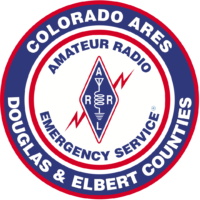The following is a list of training requirements and activities for new members of ARESDEC. As a new member, you are always welcome to participate in any and all ARESDEC activities when accompanied by another deployable member. All of these requirements must be completed before a new member can be considered “solo-deployable.” When you have completed a course, please send a message with a copy of your certificate of completion to training@aresdec.org so the training officer can update our records.
- ARESDEC New Member Training (NMT)– Outlines proper communication techniques and procedures specific to ARESDEC. Contact training@aresdec.org for information on upcoming New Member Training offered by ARESDEC. This course is usually offered twice per year, as needed, depending on the number of new applicants.
- ARRL Basic EmComm – This free course is designed to provide basic knowledge and tools for any emergency communications volunteer. The Basic Emcomm course contains three modules and 11 topics, including required prerequisites, and is expected to take approximately 10 – 20 hours to complete. You will have access to the course platform in the ARRL Learning Center at any time of day while you work to complete the course so that you may work according to your own schedule. If you enjoyed Basic EmComm and hunger for more related knowledge, check out Intermediate EmComm and Advanced EmComm from ARRL. Intermediate and Advanced are not an ARES R1D5 new member training requirement but can further supplement your EmComm knowledge.
- National Incident Management System (NIMS) – These four on-line courses are provided by FEMA. A FEMA Student ID (SID) is required to register for and participate in any training provided by FEMA. The FEMA SID will serve as your unique identifier and be used to maintain the record of FEMA training you attended. Just go to https://cdp.dhs.gov/femasid to register for a FEMA SID. We recommend using CO Train to register for the four FEMA courses because CO Train provides a consolidated transcript of courses completed. After registering for the courses via CO Train you will be redirected to the FEMA website to complete the actual course. All four courses below need to be completed. Each course will take about 2 – 4 hours and has a test at the end.
- IS-100.c – Via CO Train: IS-100.C: Introduction to the Incident Command System, ICS 100
- Alternatively, via FEMA: Introduction to the Incident Command System (ICS)
- IS-200.c – Via CO Train: IS-200.C: Basic Incident Command System for Initial Response
- Alternatively, via FEMA: ICS for Single Resources and Initial Action Incidents
- IS-700.b – Via CO Train: IS-700.B: An Introduction to the National Incident Management System
- Alternatively, via FEMA: National Incident Command System (NIMS) An Introduction
- IS-800.d – Via CO Train: IS-800.D: National Response Framework, An Introduction
- Alternatively, via FEMA: National Response Framework, An Introduction
There are many other courses available through the FEMA Independent Study Program which you may find interesting. You can view the whole list of these courses here: https://training.fema.gov/is/crslist.aspx?page=9
- You must also act as the NCS for our weekly on-the-air Nets at least twice. This ensures that you have a good grasp of ARESDEC formal Net procedures and communication practices before you go “solo”. You should review, practice and understand Basic Emergency Communication Practices and Controlled Net Guidelines put forth by ARESDEC.
- Finally, you must participate in at least one Simulated Emergency Test (SET) exercise, or another significant planned ARESDEC event.
